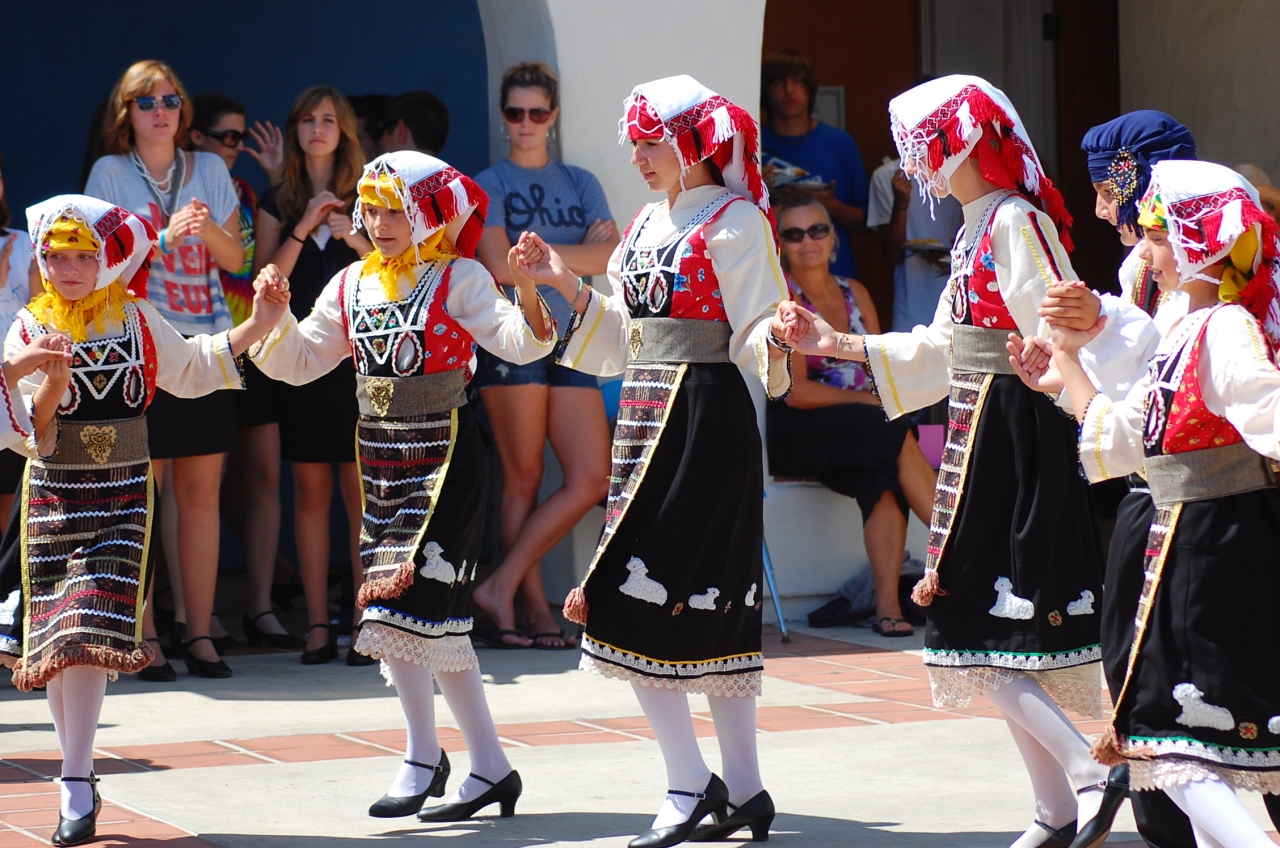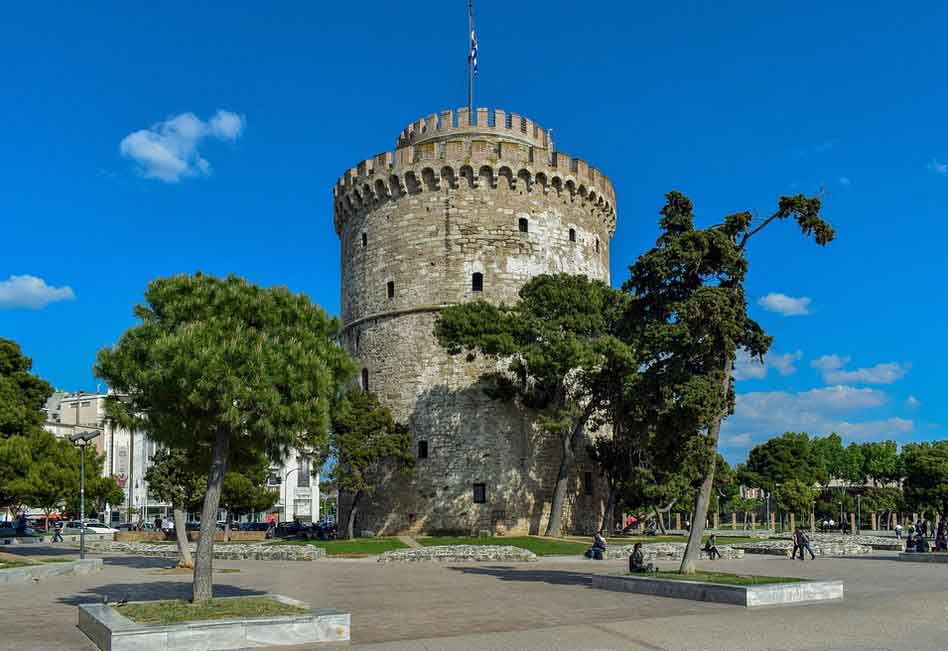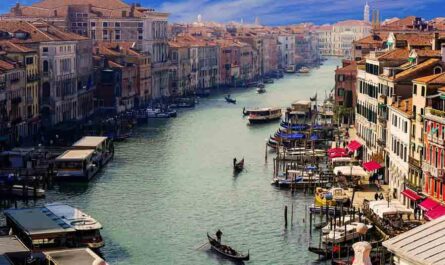There are many fun facts to know about Greece. Winston Churchill once said, “Thus, we will not say that Greeks fight like heroes, but that heroes fight like Greeks.” This European country consists of a picturesque sea image, ancient ruins, white-domed churches, Mediterranean houses, and islands. It commemorates Alexander, the beginning of democracy, Plato, Socrates, and the characters of the Bible. Greece certainly has a past of huge proportions. It is a fantastic country that has so much to offer tourists.
Fun Facts about Greece
The economy relies on tourism, shipping, and agriculture, with olives and grapes being key exports. The Greek people are known for their warmth and hospitality, fostering a vibrant lifestyle filled with traditional customs, music, and dance. Here we are going to find out some of the fun facts about Greece, the tiny country with a rich past and present.
1. Athens: A Capital with Staggering Growth
Over 40% of Greece’s populace calls the bustling capital, Athens, home. Nestled amidst historical ruins and modern structures, Athens, known as Athina in Greek, has undergone a remarkable transformation. From a mere 10,000 inhabitants in 1834, the city burgeoned to a staggering 3.6 million by 2001. This exponential growth mirrors the evolution of Athens from a historical city to the thriving heart of contemporary Greece. The streets, once walked by ancient philosophers, now echo the vibrant pulse of a cosmopolitan metropolis.
2. Archipelago Marvel: Greece’s Island Tapestry
Greece boasts a captivating archipelago, comprising over 2,000 islands, each with its unique charm. Among them, approximately 170 islands are inhabited, forming a mosaic of cultures and landscapes. The crown jewel of these islands is Crete, with a vast expanse of 3,189 square miles (8,260 sq. km.). Picture azure waters, white-washed buildings, and a rich tapestry of history—these islands are not just geographical entities but living embodiments of Greece’s diverse heritage.
3. Ancestral Threads: Greeks and the Mycenaean Dawn
The roots of Greece trace back to the Indo-Europeans, who ventured into the land around 1900 B.C. In a historical dance, they coexisted with the Minoans for centuries, laying the groundwork for the Mycenaean civilization. However, this flourishing era met an abrupt end in the twelfth century B.C. During a perplexing “dark ages” spanning 300 years, the flame of knowledge flickered, and the art of writing was temporarily lost. Emerging from this obscurity, Greece gave birth to one of history’s most influential civilizations: Classical Greece. The echoes of this period still resound in philosophy, art, and governance.
4. Sea Sponge Capital: Greece’s Aquatic Wealth
Beyond its historical and cultural riches, Greece is a maritime marvel, holding the title of the leading producer of sea sponges. The azure waters that lap against its shores harbor a bounty of these aquatic organisms. The sponge industry is not merely an economic endeavor; it is a reflection of Greece’s symbiotic relationship with its coastal environment. As the world dives into modernity, Greece remains deeply connected to its sea-centric heritage, making it not only a cultural and historical hub but also a custodian of the treasures beneath its waves.
5. Greek Influence on English Phrases
The profound linguistic legacy of ancient Greece reverberates through the corridors of English expression, as thousands of phrases seamlessly woven into the tapestry of contemporary communication trace their origins back to the Hellenic realm. This linguistic journey commences with the graceful dance of words transitioning from Greek, embraced by the sophisticated clasp of the Romans, and finally finding residence in the rich lexical landscape of English. Among these linguistic transplants are familiar companions such as “academy,” a bastion of learning and intellectual pursuit; “apology,” an eloquent means of seeking forgiveness; the enduring endurance of “marathon”; the seductive allure of the mythical “siren”; the fundamental building blocks encapsulated in the “alphabet”; and the tempestuous fury of nature embodied in the formidable “typhoon.” Each of these linguistic emissaries bears witness to the enduring influence of Greek on the English language.
6. Greece’s Archaeological Museums: A Bounty of Antiquity
In the realm of cultural preservation, Greece stands as a peerless custodian, boasting an awe-inspiring abundance of archaeological museums that surpass the offerings of any other nation on our planet. These repositories of antiquity are veritable treasure troves, where the echoes of ancient civilizations reverberate through meticulously curated exhibits. From the Parthenon’s marbles to the artifacts of Delphi, these museums unfold the narrative of Greece’s historical grandeur, ensuring that the footprints of time are preserved for the scrutiny and admiration of generations yet unborn. This unparalleled commitment to the preservation of cultural heritage solidifies Greece’s status as an indomitable guardian of history.
7. Soccer’s Hellenic Embrace
In the amphitheater of athletic fervor, Greece unapologetically declares its allegiance to football, a sport known to Americans as soccer. Beyond the azure seas and sun-kissed landscapes, football emerges as the national sport, a unifying force that transcends regional boundaries and linguistic nuances. The vibrancy of the sport pulsates through the hearts of Greeks, creating a tapestry where athletic prowess interlaces with national pride. In this arena, the spirit of competition converges with a shared enthusiasm, painting a vivid portrait of a nation bound together by the universal language of the beautiful game.
8. The Greek Civilization’s Prolific Governance Odyssey
Scholars, with the weight of historical epochs upon their shoulders, posit a captivating thesis — the Greek civilization’s endurance through the annals of time has afforded it a front-row seat to the grand theatre of governance. A civilization so venerable that it has weathered the tempests of millennia, offering itself as an experimental crucible for almost every conceivable permutation of governance.
From the democratic ideals of Athens to the oligarchic structures elsewhere, the Hellenic civilization emerges as a resilient crucible, where the molten ideals of governance have been cast, tested, and refined over epochs, leaving an indelible imprint on the pages of political evolution. The narrative of Greece becomes a captivating saga of governance, a tale spun across the loom of time, where the threads of authority are woven into a complex tapestry of political exploration and endurance.
9. Unemployment in Greece: A Struggle for the Educated
About 10% of Greek adults find themselves in the throes of unemployment, grappling with the daunting challenge of securing gainful employment even in the wake of obtaining a university education. The pervasive nature of job scarcity has cast a shadow over the aspirations of educated individuals, rendering the quest for employment a Herculean task. The labyrinthine job market proves to be an insurmountable maze, leaving a significant portion of the Greek populace in a state of economic uncertainty and professional limbo.
10. Tragedy in Greek Theater: A Peculiar Etymology
The profound legacy of Greek theater is encapsulated in the etymology of the word “tragedy,” which translates to “goat-song” in Greek. This curious nomenclature harks back to the early roots of Greek tragedies, where the performances paid homage to Dionysus, the god of wine. In these solemn theatrical renditions, actors adorned themselves with goatskins, embodying the essence of the tragic narrative. These tragedies, steeped in nobility, unfolded epic tales of gods, kings, and heroes, showcasing the artistic prowess of ancient Greek playwrights. In stark contrast, the realm of comedy, or “revel,” delved into the humorous exploits of lower-class characters, providing a contrasting and lighthearted counterpart to the weighty tragedies.
11. Nikos Kazantzakis: A Literary Luminary and Controversial Figure
Nikos Kazantzakis (1883-1957), a luminary in the realm of Greek literature, stands as a figure of both acclaim and controversy. Renowned for his masterpieces such as “Zorba the Greek” and “The Last Temptation of Christ,” Kazantzakis’s literary prowess transcended borders, leading to cinematic adaptations of his works. However, this fame came at a cost, as the Greek Orthodox Church expelled him on account of the controversial themes explored in “The Last Temptation of Christ.” Kazantzakis, a modern literary titan, thus became a symbol of the intersection between artistic expression and societal norms, leaving an indelible mark on the cultural landscape of Greece.
12. The Hellenic Republic: Greece by Any Other Name
Greece, officially known as the Hellenic Republic, boasts a rich historical and cultural tapestry. Beyond its official moniker, the nation is also referred to as Ellas or Ellada, echoing the depth of its heritage. The multifaceted identity encapsulated in these names reflects the intricate blend of tradition and modernity that defines Greece. Whether acknowledged as the Hellenic Republic or addressed through its colloquial aliases, the country stands as a testament to the enduring legacy of Greek civilization, encapsulating a narrative that spans millennia.
13. The Birth of Arithmetic in Ancient Greece
The ancient Greeks, renowned as trailblazers in the realm of intellectual pursuits, merit recognition as the architects of arithmetic, attributing this distinction to their pioneering efforts in transforming it into a theoretical discipline. The seminal contributions of Greek mathematical luminaries, including but not limited to Pythagoras, Euclid, Archimedes, and Apollonius, serve as the bedrock upon which the edifice of contemporary mathematics stands. These brilliant minds, through their groundbreaking work, bequeathed a legacy that transcends the epochs, shaping the very essence of mathematical thought and inquiry.
14. Marble Marvel: Greece’s Global Dominance
Greece stands proudly as one of the globe’s foremost cultivators of marble, contributing a staggering 7% to the world’s total marble production. In the fiscal year 2015 alone, the Hellenic nation amassed an impressive $131.8 million through the exportation of this prized stone. This economic feat underscores Greece’s pivotal role in the international marble market, solidifying its stature as a powerhouse in this exquisite industry—a facet of Greek identity not often explored but truly remarkable, especially when considering its impact on the global economic tapestry. For the inquisitive minds of young learners, this emerges as a fascinating tidbit, revealing the economic prowess and unique contributions of Greece to the world at large.
15. Olive Oasis: Greece’s Verdant Bounty
Greece, a Mediterranean jewel, asserts itself as the third-largest producer of olives globally, trailing only behind Spain and Italy in this aromatic endeavor. The Hellenic landscape, adorned with lush groves, yields a staggering annual harvest of 2,232,412 metric tons of olives. An astonishing 60% of the nation’s expansive terrain is dedicated to olive cultivation, weaving a verdant tapestry that defines much of the Greek countryside.
Delving further into the geographical nuances, approximately 65% of the olive oil produced within the country emanates from the Peloponnese region, with Crete and the Aegean and Ionian Islands following suit. This intricate cultivation landscape unveils a harmonious dance between nature’s bounty and human ingenuity, offering a captivating glimpse into Greece’s agricultural richness—an aspect that not only shapes its gastronomic identity but also sustains a vital sector of its economy.
16. Literacy Evolution in Greece
In the 1950s, an era marked by its unique challenges and transformations, a mere 30% of Greek-born adults possessed the ability to read and write. This statistical snapshot encapsulates a time when educational opportunities were undergoing metamorphosis, hinting at a society grappling with literacy constraints. Fast forward to contemporary times, and Greece has orchestrated a remarkable ascent on the literacy front. Today, the literacy rate has burgeoned to over 50%, unveiling a profound journey from the confines of limited literacy to a more enlightened populace. This intriguing evolution stands as a testament to Greece’s commitment to intellectual empowerment, exemplifying a significant facet of the nation’s historical narrative.

17. Radiant Days: Greece’s Sun-Drenched Landscape
Bathed in the brilliance of sunshine, Greece unfolds its allure with an astounding revelation: it basks in the glow of more than 250 days of sunlight annually. This celestial symphony, offering approximately 3,000 sun-kissed days per year, paints a vivid portrait of the nation’s climatic tapestry. Greece, draped in the Mediterranean climate, weaves a narrative that oscillates between gentle, rain-laden winters and the embrace of warm, arid summers. An ever-pervasive golden hue punctuates the majority of days, casting a luminous sheen over this enchanting land. Such meteorological splendor establishes Greece as a haven for sun-seekers, beckoning them into a perpetual dance with the sun’s radiance.
18. Alexander the Great: Conqueror of Continents
Greece, the cradle of civilization, proudly claims Alexander the Great as one of its most illustrious sons. This indomitable figure, who remains undefeated throughout his storied existence, stands as a colossus among historical rulers. The legacy of Alexander, a paragon of strategic brilliance and military prowess, reverberates across the annals of time. His empire, a sprawling domain stretching from the depths of Western Europe to the northwest reaches of India, symbolizes the zenith of conquest and dominion. In the grand tapestry of world history, Alexander emerges as an enduring emblem of Greece’s indelible impact on the global stage, etching his name into the annals of greatness.
19. Ancient Marvels: Greece’s Architectural Opulence
Greece, a living testament to the epochs that have graced its landscapes, stands adorned with the echoes of ancient architecture. The resplendent Acropolis of Athens, the historic city of Aigai, and the ethereal Sanctuary of Delphi collectively weave a narrative of architectural opulence that transcends millennia. This nation, steeped in historical significance, boasts a staggering 18 UNESCO World Heritage sites. Each architectural marvel stands as a sentinel, guarding the secrets and sagas of bygone eras. This profound connection to antiquity serves as a captivating testament to Greece’s enduring commitment to preserving and showcasing the majestic remnants of its past, captivating the imaginations of those who venture into its storied realms.
20. Tourism Triumphs: Greece’s Magnetic Allure
Greece emerges as a siren of tourism, beckoning travelers from across the globe with its enchanting landscapes and historical treasures. Securing the ninth spot in Europe’s tourism hierarchy in 2015, Greece welcomed a staggering 26.5 million tourists, becoming a beacon of allure in the Mediterranean. Iconic destinations such as the historic capital, Athens, the idyllic Santorini, the vibrant Mykonos, and the captivating Fira Islands contribute to this tourism saga.
A noteworthy facet is the role tourism plays in Greece’s economic narrative, constituting approximately 5% of the nation’s total domestic production. The intricate interplay between historical legacy and contemporary charm paints Greece as an unmissable destination, weaving an unforgettable tapestry for the wanderlust-infused traveler. This factoid not only underscores Greece’s touristic eminence but also illuminates the symbiotic relationship between its cultural treasures and the global nomadic spirit.
21. Mountain Majesty: Greece’s Alpine Grandeur
Hidden behind the sun-soaked beaches and ancient ruins, Greece reveals its rugged side—more than 5% of its terrain is shrouded in majestic mountains, rendering it one of Europe’s most topographically diverse nations. A crown jewel among these peaks is Mount Olympus, standing tall at 2,918 meters (9,573 feet), a mythical abode of the Greek gods themselves. This staggering elevation places it as the loftiest summit in the country, emblematic not only of Greece’s geographical diversity but also of the rich tapestry of mythology interwoven into its very landscape. This revelation adds another layer to the multifaceted allure of Greece, inviting exploration beyond its celebrated coastal vistas and historical marvels into the cradle of ancient legends and untamed natural grandeur.
22. Pioneering Waste Management in Ancient Greece
In a testament to their advanced societal organization, Greece etched its name in history by orchestrating the inauguration of the first municipal dump in the Western world, a feat accomplished circa 500 B.C. This landmark initiative not only underscores the Greeks’ penchant for civic planning but also stands as a testament to their progressive approach to addressing communal challenges. The establishment of such a disposal system highlights the sophisticated urban planning that characterized ancient Greek civilizations, leaving an indelible mark on the annals of waste management history.
23. The Origin of Greek Tragedy
In the annals of theatrical history, the genesis of Greek tragedy can be traced back to the year 534 B.C., a pivotal moment when a priest of Dionysus named Thespis orchestrated the inaugural performance. It wasn’t merely a mere staging; Thespis, in a groundbreaking move, not only directed the proceedings but also penned and performed a distinct component that deviated from the conventional tragic refrain. This innovative departure from tradition marked him not only as a director but also as the very first actor, etching his name into the etymology of drama. Intriguingly, the term “thespian,” now synonymous with actor, finds its linguistic roots in the nomenclature of this trailblazing figure, adding an extra layer of significance to the inception of Greek tragedy.
24. Spartan Warriors: Grooming Rituals and Battle Preparations
Delving into the intriguing customs of Spartan warriors unveils a peculiar practice that characterized these formidable soldiers. Renowned for their martial prowess, Spartan warriors were equally fastidious about their appearance, particularly their long, flowing hair. In a fascinating pre-battle ritual, these soldiers meticulously combed their hair, elevating grooming to a ceremonial act. Adding a layer of symbolism to this grooming regimen, cowardly soldiers faced a distinctive consequence—half of their hair and half of their beards were shaved off. This distinctive practice not only underscores the Spartan commitment to discipline and order but also adds a captivating dimension to the cultural and social intricacies of ancient Greek military life.
25. A Sun-Kissed Haven: Greece’s Abundance of Sunshine
Greece, blessed by the gods and nature alike, basks in the glory of over 250 days of sunshine annually, translating to an impressive 3,000 sunlit hours each year. This meteorological endowment contributes not only to the country’s picturesque landscapes but also fosters a vibrant and sun-drenched ambiance that permeates the cultural and social fabric of the nation. The abundance of sunlight, a climatic treasure trove, enhances the allure of Greece as a destination where azure skies and golden rays converge to create an idyllic haven for residents and visitors alike. Business – Money Making – Marketing – Ecommerce
26. The Magnitude of the Juries
In the ancient tapestry of Greek society, the enormity of their juries was a spectacle to behold, a vast assemblage echoing with the cacophony of diverse voices. These judicial gatherings, comprising a multitude of citizens, stood as pillars of the Hellenic legal system. The sheer scale of these juries was not merely a numerical phenomenon; it embodied the collective consciousness and democratic fervor that coursed through the veins of ancient Greece. The grandiosity of these gatherings painted a vivid picture of civic participation, symbolizing a society deeply invested in the principles of justice and communal decision-making.
27. Athens: Europe’s Oldest Capital City
Nestled in the heart of Greece, Athens stands as a venerable testament to time, proudly bearing the prestigious title of Europe’s oldest capital city. A city with a history so rich and profound that every cobblestone seems to whisper tales of antiquity. The labyrinthine streets echo with the footsteps of ancient philosophers, the laughter of gods, and the murmurs of democratic ideals that have shaped civilizations for centuries. A stroll through the Plaka district reveals a juxtaposition of modernity against the backdrop of ancient ruins, an intricate dance between past and present that defines Athens.
28. Polytheistic Pantheon: A Tapestry of Deities
Within the sacred precincts of Greek spirituality, a pantheon of Gods and Goddesses reigned supreme, each a personification of the myriad facets of existence. This polytheistic tapestry was woven with reverence and awe, a testament to the multifaceted nature of the Greek worldview. From the lofty realms of Mount Olympus to the depths of the underworld, these divine entities governed various domains, shaping the destinies of mortals and immortals alike. The worship of this diverse pantheon served as a conduit for the Greeks to navigate the complexities of life, seeking divine guidance in moments of joy, sorrow, and uncertainty. Women’s health, pregnancy, supplements, breastfeeding
29. Olympian Abode: A Divine Residence
Amidst the celestial grandeur, a select assembly of twelve deities found their divine abode on the lofty peaks of Mount Olympus. This celestial dwelling was not merely a physical location but a metaphysical realm where the gods convened to deliberate on the affairs of both gods and mortals. The Olympian pantheon, led by the mighty Zeus, unfolded in all its splendor against the backdrop of this mythical mountain. The stories of their interactions, conflicts, and alliances on Mount Olympus served as a rich tapestry, weaving together the fabric of Greek mythology and emphasizing the divine hierarchy that influenced the course of ancient Greek narratives.
30. Hellenes: The Self-Identified Greeks
In the annals of self-designation, the ancient Greeks proudly referred to themselves as ‘Hellenes.’ This ethnonym encapsulated not only a geographical identity but also a cultural and linguistic affiliation. The term ‘Hellenes’ resonated with a sense of shared heritage, a recognition of common values, traditions, and the Greek language that bound them together. It became a cultural beacon, signaling unity among the diverse city-states that dotted the Greek landscape. To be a Hellene was to be part of a collective identity that transcended individual polities, reinforcing the notion of a broader Greek civilization with a shared sense of purpose and destiny. Gift baskets are one of the amazing gifts people love on any occasion
31. The Art of Greek Greetings: A Nonverbal Symphony
In the intricate tapestry of Greek social customs, the subtleties of nonverbal communication weave a narrative that transcends linguistic boundaries. A peculiar facet of this cultural mosaic is the distinctive method of greeting, where waving assumes a nuanced significance. Contrary to the conventional open-handed wave, Greeks eschew this gesture, deeming it an affront to extend the palm with fingers outstretched. Instead, the Hellenic art of salutation involves a closed-palm wave, a gesture imbued with cultural intricacies that convey respect and avoid unintended slights. This idiosyncrasy exemplifies the richness of Greek customs, where even the nuances of a wave become a silent symphony of cultural expression.
Other Interesting Articles
- 30 Interesting Facts about Abu Dhabi Tourism
- 20 Interesting Switzerland Facts One Should Know
- 26 Interesting Great Pyramid of Giza Facts
- 12 Persian Empire Facts and Achievements
- El Salvador History – How the Country Moves On
- History of Latin America – Twists and Thrills
- Spanish Colonization of the Americas
- The United States in Order of Statehood
- Dumb Laws in the US You Should Know Before Travel
- British National Museum Tourists Guide with Time Table
- British History Museum Collection Tourist Guide
- 81 Interesting Facts about Singapore
- British War Museum Stands with a Glorious Past
- 130 Facts of El Salvador Everyone Should Know
- 52 Interesting Fun Facts about New Mexico, USA
- 200 Interesting Facts About Thailand
- Jollof Rice Recipe for Nigerian – Taste, and Preparation



